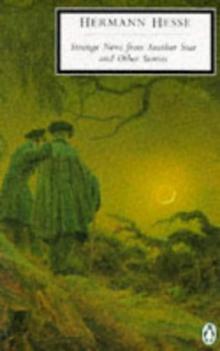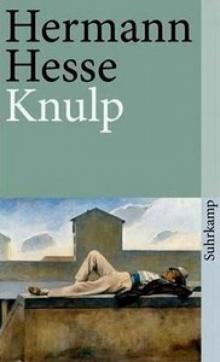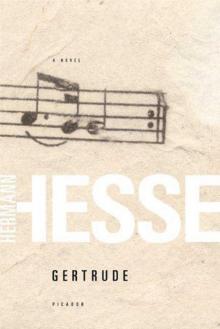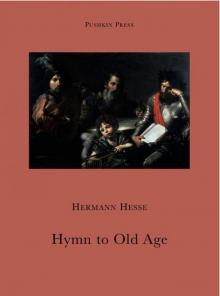- Home
- Hermann Hesse
Strange News From Another Star Page 4
Strange News From Another Star Read online
Page 4
Han Fook no longer knew how many years he had spent with the Master beside the source of the Great River; often it seemed to him as though he had entered this valley only the evening before and been received by the ancient playing on his stringed instrument; often, too, it seemed as though all the ages and epochs of man had vanished behind him and become unreal.
And then one morning he awoke alone in the house, and though he searched everywhere and called, the Master had disappeared. Overnight it seemed suddenly to have become autumn, a raw wind tugged at the old hut, and over the ridge of the mountain great flights of migratory birds were moving, though it was not yet the season for that.
Then Han Fook took the little lute with him and descended to his native province, and when he came among men they greeted him with the salutation appropriate to the aged and distinguished, and when he came to his home city he found that his father and his bride and his relations had died and other people were living in their houses. In the evening, however, the festival of the lanterns was celebrated on the river and the poet Han Fook stood on the far side of the darker bank, leaning against the trunk of an ancient tree. And when he played on the little lute, the women began to sigh and looked into the night, enchanted and overwhelmed, and the young men called for the lute player, whom they could not find anywhere, and they exclaimed that none of them had ever heard such tones from a lute. But Han Fook only smiled. He looked into the river where floated the mirrored images of the thousand lamps; and just as he could no longer distinguish between the reflections and reality, so he found in his soul no difference between this festival and that first one when he had stood there as a youth and heard the words of the strange Master.
Flute Dream
'Here,' said my father, handing me a small ivory flute, 'take this and don't forget your old father when you are entertaining people in foreign lands with your playing. It is now high time for you to see the world and gain knowledge. I had this flute made for you because you don't like any other kind of work and always just want to sing. Only be sure always to choose bright, cheery songs, otherwise it would be a pity about the gift God has given you.'
My dear father understood little about music, he was a scholar; he thought all I had to do was blow into the pretty little flute and that would be that. I did not wish to undeceive him, and so I gave him my thanks, put the flute in my pocket, and took my departure.
Our valley was familiar to me only as far as the big farm mill; and so beyond that the world began, and it pleased me greatly. A bee, tired from flying about, had lighted on my sleeve; I took her with me so that later on at my first resting place I would have a messenger ready to send back home with my greetings.
Woods and meadows accompanied me on my way and the river ran merrily beside me; I saw that the world was little different from my home. The trees and flowers, the ears of corn, and the hazel bushes spoke to me, I sang their songs with them and they understood me just as at home; the singing wakened my bee, she crept slowly up to my shoulder, flew off and circled twice around me with her deep, sweet buzzing, then steered straight as an arrow back towards home.
Presently a young girl came strolling out of the woods carrying a basket on her arm and wearing a broad shade hat of straw on her blonde head.
'Grass Gott,' I said to her, 'where are you off to?'
'I'm taking the harvesters their dinner,' she said, walking beside me. 'And where are you going today?'
'I am going out into the world, my father sent me. He thinks I ought to give concerts on the flute, but I don't really know how, I shall have to learn first.'
'Well now. And what can you really do? Everyone has to be able to do something, after all.'
'Nothing special. I can sing songs.'
'What kind of songs do you sing?'
'You know, all kinds of songs, for the morning and the evening, and for all the trees and the animals and the flowers. Now, for example, I could sing a pretty song about a young girl coming out of the woods and taking the harvesters their dinner.'
'Could you really? Then go ahead and sing it!'
'Yes, but what's your name?'
'Brigitte.'
Then I sang a song about the beautiful Brigitte in her straw hat and what she had in her basket, and how all the flowers stared at her, and the blue bindweed in the garden hedge reached out after her, and all the other particulars. She paid strict attention and said it was good. And when I told her I was hungry, she raised the lid of her basket and got out a piece of bread. I took a bite of it, continuing to walk rapidly, and she said: 'You mustn't run while you're eating. One thing after the other.' And so we sat down in the grass and I ate my bread, and she clasped her brown hands around her knees and looked at me.
'Will you sing something else for me?' she asked when I had finished.
'Of course I will. What shall it be?'
'About a girl whose darling ran away from her and she is sad.'
'No, I can't do that. I don't know what that would be like, and anyway one oughtn't to be so sad. I must only sing bright, cheery songs, my father said. I'll sing to you about the cuckoo bird or the butterfly.'
'Then you know nothing at all about love?' she asked.
'About love? Oh, yes, I do. That is the most beautiful thing of all.'
I began at once and sang about the sunbeam that has fallen in love with the red poppy blossoms and how it sports with them and is filled with joy. And about the female finch when she is waiting for the male, and when he comes she flies away and pretends to be terrified. I sang further about the girl with brown eyes and about the youth who comes along and sings and is rewarded with a piece of bread; but now he does not want any more bread, he wants a kiss from the girl and wants to look into her brown eyes, and he will go on singing and will not stop until she begins to smile and shuts his mouth with her lips.
Then Brigitte bent over and shut my mouth with her lips and closed her eyes and then opened them again, and I looked into the close-up, brown-golden stars in which I saw myself and a few white meadow flowers reflected.
'The world is very beautiful,' I said. 'My father was quite right. Now I will help you carry your basket and we will take it to your people.'
I picked up her basket and we walked on, her footsteps ringing with mine and her merriment matching my own, and the forest whispered gently and coolly from the mountain heights; I had never wandered with so much joy, I continued to sing gaily for a while until I had to stop from sheer superabundance; there were just too many songs coming from valley and mountain, from grass and trees and river and underbrush, all the whisperings and the stories.
Then I had to reflect: If I could simultaneously understand and sing all these thousands of songs of the world, about the grass and flowers and people and clouds and about everything, the leafy forests and the pine forests and all the animals, and also about the distant seas and mountains and the stars and the moon, and if all this could resound and sing inside me at once, then I would be God Almighty and each new song would take its place in the sky as a star.
But while I was thinking this, perfectly still inside, filled with wonder because such a thing had never come into my mind before, Brigitte stopped and held me back by the handle of the basket.
'Now I must go up this way,' she said. 'Our people are up there in the field. And you, where are you going? Will you come with me?'
'No, I cannot come with you. I must go out into the world. My best thanks for the bread, Brigitte, and for the kiss. I will think of you.'
She took her dinner basket, and across it she once more bent her eyes upon me in the brown shadow, and her lips clung to mine and her kiss was so sweet and good that I almost grew sad from sheer gladness. Then I hastily called farewell and walked quickly off down the road.
The girl climbed slowly up the mountainside, and under the hanging foliage of the beech trees at the forest's edge she stopped and gazed after me, and when I signalled to her, waving my hat over my head, she nodded once and disappeared
into the shadow of the beeches, as silent as a picture.
I, however, went on my way absorbed in my own thoughts until the road turned a corner.
There stood a mill and beside the mill a boat lay in the water and in it sat a solitary man who seemed to have been waiting just for me, for as I touched my hat to him and climbed aboard, the boat immediately began to move and ran downstream. I sat amidships and the man sat in the stern at the helm, and when I asked him where we were going he raised his head and stared at me with veiled grey eyes.
'Wherever you like,' he said in a low tone. 'Downstream and into the ocean, or to the great cities, you have your choice. It all belongs to me.'
'It all belongs to you? Then you are the King?'
'Perhaps,' he said. 'And you are a poet, it seems. Then sing me a song as we travel.'
I pulled myself together. Fear filled me because of the solemn grey man and because our boat moved so fast and silently down the river. I sang about the river, which carries boats and mirrors the sun and boils up on the rocky shores and is happy when it completes its wanderings.
The man's face remained expressionless, and when I stopped singing he nodded as silent as a dreamer, and then all at once to my astonishment he began to sing himself, and he too sang of the river and of the river's journey through the valleys, and his song was more beautiful and more powerful than mine, but in it everything sounded quite different.
The river, as he sang of it, rushed down from the hills like a roistering vandal, dark and wild; with gnashing teeth it fought against the constraint of mills and arching bridges; it loathed every boat it had to carry, and in its waves and long green waterweed it smilingly cradled the white corpses of the drowned.
All this pleased me not at all, and yet the sound of it was so beautiful and mysterious that I became wholly confused and fell silent in my distress. If what this subtle clever old bard was singing in his muted voice was true, then all my songs were only nonsense and silly child's play. Then the world at bottom was not good and bright like God's own heart, but dark and desperate, evil and sombre, and when the woods rustled, it was not from joy but from pain.
We voyaged on and the shadows lengthened, and each time I began to sing, it sounded less assured and my voice grew fainter, and each time the strange singer would answer me with a song that made the world ever more enigmatic and sorrowful and me ever more oppressed and sad.
My soul ached and I lamented not having stayed on shore with the flowers or with beautiful Brigitte, and to console myself in the growing dusk I began to sing again in a loud voice and I sang amid the red glow of evening the song of Brigitte and her kisses.
Then twilight came and I fell silent, and the man at the helm sang, and he too sang of love and the pleasures of love, of brown eyes and of blue eyes, of moist red lips, and his impassioned singing above the darkening flood was beautiful and moving, but in his song love too had become dark and terrifying and a deadly mystery for which men groped, mad and bleeding in their misery, and with which they tortured and killed one another.
I gave ear and grew as weary and troubled as though I had already been under way for years and had travelled through nothing but sorrow and misery. I felt a constant faint chilly stream of sorrow and anguish creeping across to me from the stranger, and into my heart.
'Well then, life is not the highest and best,' I cried at last, bitterly, 'but death is. Then I beseech you, sorrowful King, sing me a song of death!'
The man at the helm now sang about death, and his singing was more beautiful than anything I had ever heard. But even death was not the highest and best, even in death there was no comfort. Death was life, and life was death, and they were locked together in an eternal, mad love-battle, and this was the final word and the meaning of the world, and thence came a radiance that could glorify all misery, and thence came a shadow that troubled all joy and beauty and shrouded them in darkness. But from out of this darkness, joy burned more intimately and more beautifully, and love had a deeper glow within this night.
I listened, and had become perfectly still; there was no more will in me save that of this strange man. His glance rested on me calmly and with a certain sad kindliness, and his grey eyes were full of the sorrow and the beauty of the world. He smiled at me and then I took heart and pleaded in my misery: 'Oh, let us put about, you! I am fearful here in the dark and I want to turn back and go where I can find Brigitte, or home to my father.'
The man stood up and pointed into the night, and the lantern shone bright on his thin, determined face. 'There is no way back,' he said solemnly and gently. 'One must continue to go forward if one wants to fathom the world. And you have already had what is best and finest from the girl with the brown eyes, and the farther you are from her the better and finer it will be. But no matter, sail on, wherever you wish. I will give you my place at the helm!'
I was in deathly despair and yet I saw that he was right. Full of yearning, I thought of Brigitte and of my home and of everything that had so recently been near and bright and my own, and that I had now lost. But now I must take the stranger's place and man the helm, so it must be.
Therefore, I got up in silence and stepped through the boat towards the pilot's seat, and the man came towards me silently, and as we were passing he looked fixedly into my face and handed me his lantern.
But when I was seated at the helm and had placed the lantern beside me, I was alone in the boat. I recognized with a deep shudder that the man had disappeared, and yet I was not surprised, I had had a premonition. It seemed to me that the beautiful day of wandering and Brigitte and my father and my homeland had been only dreams and that I was old and sorrowful and had already been voyaging forever and ever on this nocturnal river.
I knew that I must not call the man, and recognition of the truth came over me like a chill.
To make sure of what I already suspected, I leaned out over the water and lifted the lantern, and out of the black watery mirror a face peered up at me, a face with severe and solemn features and grey eyes, an old knowing face, and it was I.
And since no way led back, I voyaged forth over the dark waters deeper into the night.
Strange News from Another Star
A southern province of our lovely star had suffered a great calamity. An earthquake accompanied by fearful thunderstorms and floods had destroyed three large villages together with all the farms and gardens, fields and woods. A great many people and animals had been killed and, saddest of all, there was a total lack of flowers in adequate quantity to wreathe the dead and appropriately adorn their last resting-places.
Whatever could be done was, of course, done promptly. Immediately after the dreadful hour, messengers bearing an urgent appeal in the name of charity hurried through the nearby countryside, and from all the towers in the province precentors intoned the deeply moving verses known from of old as the Hymn to the Goddess of Compassion, whose strains no man could resist. Sympathizers and helpers came in throngs from all the cities and towns, and the unfortunates who were shelterless were showered with cordial invitations from relations, friends, and even strangers, to share their homes. Food and clothing, horses and wagons, tools, stone, and wood, and many other materials were brought in from all sides, and while the old men, women, and children were led away by kindly hands, were comforted and cared for, while the injured were conscientiously washed and bandaged and a search for the dead was carried out among the ruins, other people were already at work clearing away fallen roofs, propping up sagging walls with beams, and preparing for a swift rebuilding. At first a breath of horror lingered in the air and there emanated from all the dead a reminder of grief and admonition to reverent silence, but soon there came into every countenance and voice a more cheerful air, a certain muted festiveness: for the common effort in this urgent undertaking and the very fact of doing something so handsome and so deserving of thanks reassured every heart. Whereas the rescuers had begun their work in awe and silence, shortly a happy voice could be heard here and
there, a subdued song accompanying the shared labour, and, as might be expected, of all the things sung the favourites were the two ancient proverbs: 'How blessed to bring aid to one newly afflicted; his heart drinks up kindness as a parched garden drinks up spring rain and responds with flowers and thanksgiving.' And that other: 'The serenity of God flows forth from action partaken of in common.'
But now they were confronted by that lamentable lack of flowers. To be sure, the dead that had been found first had been adorned with the flowers and boughs that had been collected from the ruined gardens. Then people had fetched all the available flowers from nearby towns. But the great misfortune was that the three ruined communities had had the largest and finest gardens of flowers of that season of the year. People had visited them annually to see the narcissus and crocuses, which were not to be found elsewhere in such immense quantities or so carefully cultivated or of such marvellously coloured varieties. And all this was now ruined and gone. And so people stood about in bewilderment, not knowing how the requirements of tradition were to be met for all these dead, the tradition that every human being and animal must be adorned at death with the flowers of the season and that interment be all the richer and more magnificent the more sudden and tragic the manner of death.
The Eldest of the Province, who had arrived in one of the first rescue vehicles, soon found himself so overwhelmed by questions, pleas, and complaints that he had trouble maintaining his calm cheerfulness. But with an effort he managed to quiet his heart, and his eyes remained bright and friendly, his voice clear and courteous, and his lips under his white beard never for an instant lost the peaceful, kindly smile that became him as a wise man and a counsellor.

 Beneath the Wheel
Beneath the Wheel Strange News From Another Star
Strange News From Another Star Narcissus and Goldmund
Narcissus and Goldmund Steppenwolf
Steppenwolf Siddhartha
Siddhartha Demian
Demian Knulp
Knulp Gertrude
Gertrude Rosshalde
Rosshalde The Glass Bead Game
The Glass Bead Game The Journey to the East
The Journey to the East Klingsor's Last Summer
Klingsor's Last Summer Hymn to Old Age
Hymn to Old Age Poems
Poems The Fairy Tales of Hermann Hesse
The Fairy Tales of Hermann Hesse Singapore Dream and Other Adventures
Singapore Dream and Other Adventures Soul of the Age
Soul of the Age